Bosch Beer: Circa 1950s
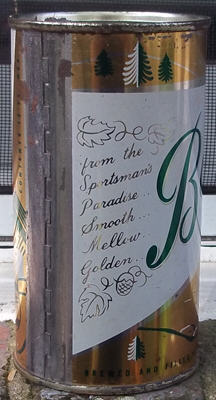 |
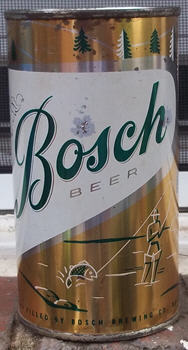 |
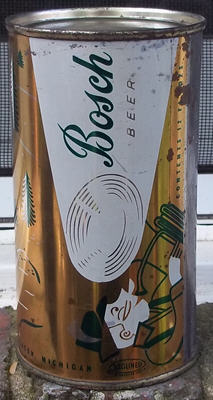 |
I decided to feature one of my favorite 1950s designs this month. I like it because of the fishing design on the front, which was a common theme on 1950s cans. It was made by Bosch Brewing in Houghton, Michigan, in the western part of the upper peninsula on Michigan.
Bosch Brewing
Bosch Brewing was in business from 1934-1973, one of over 600 breweries in the US that opened when Prohibition was repealed, only to close as the big national breweries drove most of the small breweries out of business.
Joseph Bosch, (1850-1937) like so many American brewers, was a German immigrant. He was born in Baden Germany, the son of Joseph and Mary Gleirscher Bosch. The family immigrated to the US in 1854, living in New York City until 1862. They then moved to Wisconsin where the father worked as a brewer in a couple of towns, ending up in Lake Linden. His son learned the brewing trade from his father, and then, like a good apprentice should, traveled to gain more experience from other masters of his chosen craft. In 1872 he went to Milwaukee to work at the Schlitz Brewery, and then traveled to Cleveland, Ohio and later to Louisville, Kentucky to work at breweries in those cities. (I wonder if he worked at Fehrs?)
The son Joseph founded his own brewery in 1874 back home in Lake Linden. Originally named the Torch Lake Brewery the small brewery thrived selling to thirsty miners working in the copper mines of nearby Calumet (then named Red Jacket). Bosch’s brewery grew along with the community as the mines expanded. In 1876 Bosch formed a partnership with Joseph Wertin Sr., Joseph Wertin Jr., and George Wertin and the brewery’s name was changed from the Torch Lake Brewing Company to Joseph Bosch and Company.
Bosch began bottling on a small scale by 1880, one of the few Upper Peninsula breweries to do so. By 1883 the company was producing 4000 barrels of beer annually, one quarter of it bottled. On May 20, 1887, a fire swept through the town of Lake Linden, destroying 75% of the town, including the newly expanded brewery. (Read the original NY Times story here) His home and a store he owned were also destroyed. Fortunately, Bosch had insurance, and the brewery was rebuilt and running again by early September. The company continued to grow and established branches in several neighboring communities. Still looking to expand, Bosch kept an eye open for an opportunity to open in Houghton.
In 1894, when Joseph Wertin Sr. died, Bosch bought out his remaining partners and changed the company name a final time to the Bosch Brewing Company. In 1899 Bosch bought the Union Brewery, including the Scheuermann brewing plant located on Portage Lake in Houghton. The newly organized Bosch Brewing Company continued its growth, becoming the second largest industry in the Copper Country, second only to mining. Bosch used local themes in his advertising such as the tagline “Refreshing as a sportsman’s paradise," an influence that continued as you can see on the can I have displayed above.
Prohibition and Afterwards
The brewery closed during prohibition, but when the dry years ended in 1933 the business started again, although only the Scheuermann plant reopened. In 1937, Joseph Bosch died and the brewery was taken over by his daughter, Katherine Bosch, and grandsons James and Phillip Ruppe. The brewery's business expanded, and by 1955, sales were over the 100,000 barrel mark.
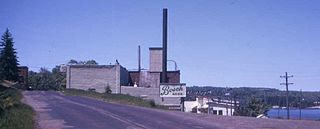 |
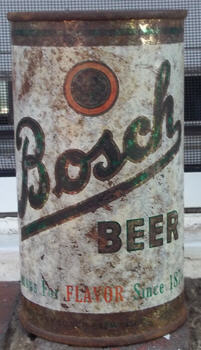 |
The Bosch brewery http://en.wikipedia.org/wiki/File:BoschBrewery.jpg |
The first Bosch beer can. |
Advertising continued the sportsman theme with slogans including “Refreshing as the Sportsman’s Paradise”, and "From the Sportsman’s Paradise…Smooth, Mellow, Golden." They must have started canning late, as all of their beer cans are from post-1949.
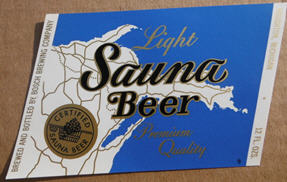 |
The brewery reached its peak in the mid 1950s, and by the end of the decade sales were declining. In 1965, the Bosch family sold the company to local investors who pushed for new technology and products to resurrect the company. In 1968, Bosch introduced Sauna Beer, developed with the help of brewers in Finland. It was a light beer similar to Finnish "kalja." Since many local residents had Finnish ancestry Sauna Beer sold well. By the late 1960s, Bosch was making three beers, all light lagers: Sauna Beer, the flagship label Bosch, and premium Gilt Edge. |
The End
In the early 1970s Bosch was unable to compete with the large breweries of Detroit, Milwaukee, and St. Louis. The brands were sold to the Jacob Leinenkugel Brewing Company of Chippewa Falls, Wisconsin. Leinenkugel continued to produce the signature Bosch brand in the traditional flavor, and even hired Bosch master brewer Vincent Charney. Brand loyalists continued drinking Bosch, but after several years, profit from the Bosch brand diminished and Leinenkugel suspended production of Bosch in 1986.
Variations
There are two major variations of this month's can listed in the USBC. One reads "Beer' under the "Bosch" and one reads "Premium Beer." However, according to Michigan can expert Randy K. the latter can only appeared as a pulltab. The flat only reads "Beer." The first zip tops also only have "Beer" with no "Premium." Later pull tabs do have the "Premium." Thus, Randy believes that any existing flats of the "Premium Beer" can are relidded. The one I have has no lid, but I trust Randy's expertise. Check out Randy's site, MBCINFO for more on Michigan beer cans.
Sources Used
I borrowed freely from the Wikipedia article on Bosch Brewing.
Biographical Record: Houghton, Baraga and Marquette Counties. Chicago, IL: Biographical Publishing Company. 1903. 121-123.
Also, Randy K. helped me a great deal. Thanks!
